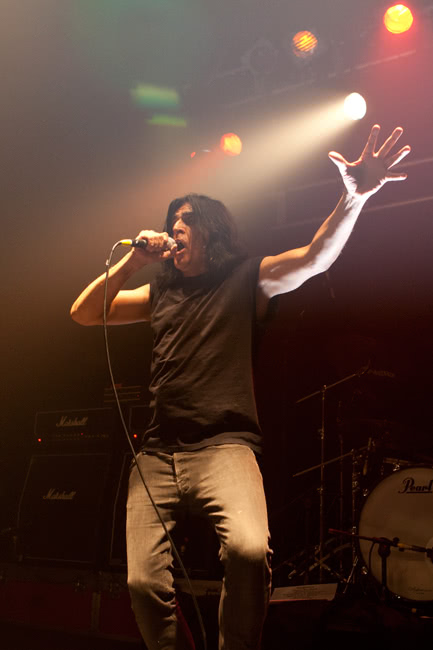The atmosphere in Billboard was anticipatory as Melbourne punk-rockers The Mercy Kills stoked the crowd for the long-awaited appearance of the legendary, genre-smashing British headliner.
They were followed by fellow Melburnians A Dead Forest Index, two brothers weaving minimalist tribal tattoo-style drums with grave, sweeping vocal layers.
Frontman Jaz Coleman himself swooped through the punters as people were still arriving, greeting friends before Killing Joke’s first Australian performance since 2004. The excitement of the multifarious crowd was palpable when he and original members Kevin “Geordie” Walker and Martin “Youth” Glover emerged on stage.
Coleman’s very first chant in “War Dance” from was enough to incite rebellion, his voice being that distinctive representation of anti-authoritarianism that still makes Killing Joke one of the most politically relevant bands in the world.
The distortion of vocals and guitar as it was intended in 1980 was perfectly executed for their opening number, but it seemed as though the sound engineer couldn’t accommodate the dramatic change to Killing Joke’s 2010 Absolute Dissent electronic sound for “European Super State”. Despite this, as soon as Reza Udhin began playing the recognisable synth, the response from the audience was that of exhilaration.
After a dedication to their late bassist Paul Raven who died in 2007, and a powerful rendition of “The Raven King”, Coleman introduced the grungy “The Beautiful Dead”. He addressed the audience and shouted “What was different thirty years ago? Well, rebellion was different. Nobody’s got rebellion left in them!” The crowd cried its indignant assent as Coleman began to strut Haka-style and tour drummer Jason Bowld – replacing Paul Ferguson who is suffering from acute tendonitis – pounded the kick, snare and cymbals.
“Nobody believes in religion anymore!” Coleman announced boldly before the next song. “This is our religion right here. It’s about a state of grace; it’s called “Rapture”.” Their industrial-metal style single from last year was played with intensity, as Coleman enacted a kind of spasmodic fit and his eyes rolled back in his head. The audience was suitably enraptured as they roared their applause.
Tribal drums introduced “Sun Goes Down” from their 1982 EP as a treat for their hard-core cult fans. Then Coleman was opining “Two decades ago there was still time for hope. We still believed in people like Peter Garrett. What happened there?” Contemptuous laughter rippled through the venue as fists began to pump and Walker launched into the well-known riff of popular New Wave single “Eighties”.
For a large number of audience members, the memory of the rebellious spirit of 1980s punk began to feel less distant. Invigorated by younger fans and Coleman’s sprightly performance, the older demographic lost whatever was left of their inhibitions with this 1984 classic. American dollar bills poured down the giant screen behind the band for “Money Is Not Our God”, then Glover told the lighting technician to turn the lights down and the strobes up for the next song.
The band blasted through “Asteroid” from the album they recorded with Dave Grohl in 2003. Coleman’s enraged yelling, Bowld’s furious Grohl-esque drumming, the industrial guitar and bass, and the sweeping synths all combined to deliver an extreme experience that the audience loved. Shouts of support returned Coleman’s mention of being “incredibly heartened to learn there was a protest against Monsanto” in Melbourne recently, and Killing Joke launched into “Corporate Elect”.
A brutal rendition of “Pandemonium” against giant screens of static followed, and the band exited to the audience clapping and stomping. After percussive demands for an encore, Killing Joke reappeared, and after admitting “I really like your Prime Minister, I think she’s gorgeous,” Coleman and Glover join vocal forces for the societal condemnation of “Madness”.
The most perfect part of the encore was when, during the hypnotic “Change”, Coleman, Glover and Walker all gathered together on-stage and rocked the hell out. It is certain after this show that these veteran punk idols are still very much musically, politically, and culturally relevant. Even though a sound engineer couldn’t keep up with the fluctuating dynamics of such a genre-bending band, they know how to inspire the inquisitive righteous mob.

































